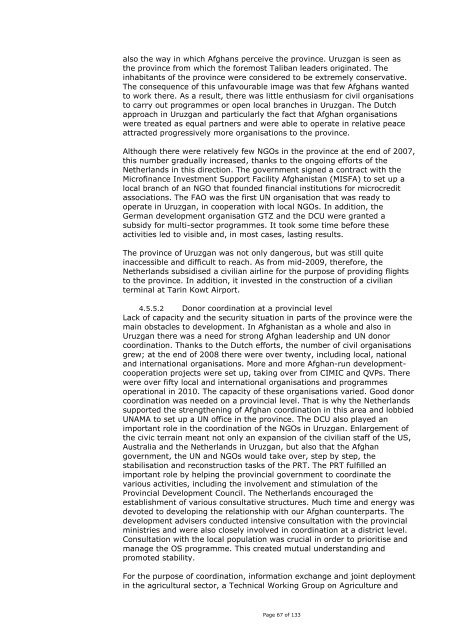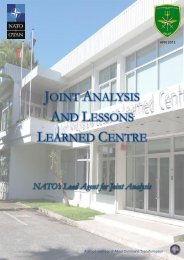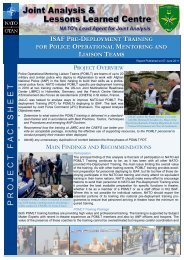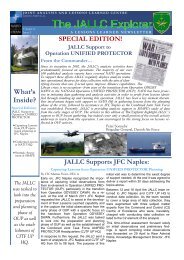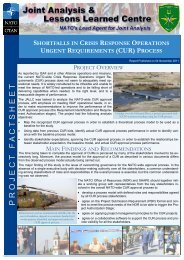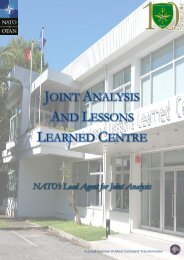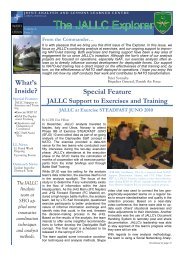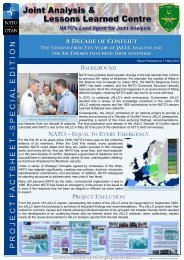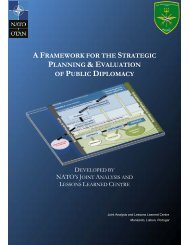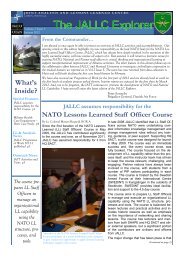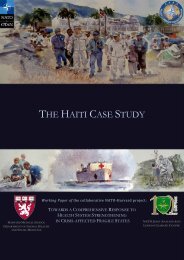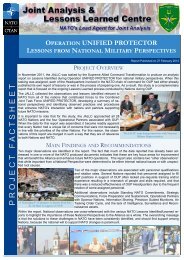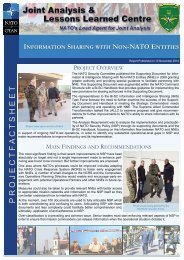As from the end of <strong>2006</strong>, the Dutch embassy concluded a number ofcontracts with the aim of gett<strong>in</strong>g national programmes operat<strong>in</strong>g <strong>in</strong>Uruzgan. These programmes related to education, health care and ruraldevelopment. Further on <strong>in</strong> this chapter they will be expla<strong>in</strong>ed further <strong>in</strong> thedescription of the Dutch efforts at a sectoral level. In order to enable theimplementation of national programmes, the <strong>Netherlands</strong> has on severaloccasions facilitated visits of Afghan m<strong>in</strong>isters to the prov<strong>in</strong>ce of Uruzgan.The <strong>Netherlands</strong> also repeatedly brought up this question dur<strong>in</strong>g bilateraltalks <strong>in</strong> Kabul.The flow of national funds down to the local level proved to be difficult,especially <strong>in</strong> the case of EQUIP. The causes were the lack of good (air)connections with the prov<strong>in</strong>ce and the lack of a bank<strong>in</strong>g system, so thatfunds had to be transported physically. The prov<strong>in</strong>cial and nationalauthorities, with the support of the embassy, lobbied national banks toopen branch offices <strong>in</strong> Uruzgan. On account of a shortage of capacity at theAfghan M<strong>in</strong>istry of F<strong>in</strong>ance and the lack of an <strong>in</strong>stitutional framework, the<strong>in</strong>troduction of "programme based budget<strong>in</strong>g” for the national budget,which had been stimulated by the World Bank and its donors, sufferedsevere delays. Despite the pressure exerted by donors on this and otherm<strong>in</strong>istries, the problem persisted for a long time.The aim of work<strong>in</strong>g as far as possible via the government also had itsdrawbacks. Adm<strong>in</strong>istrative problems had a major impact on the progress ofthe reconstruction: weak formal government structures hampered theidentification and implementation of projects. As a result of the securitysituation, there were only few implement<strong>in</strong>g organisations and littlesupervision by the World Bank at a prov<strong>in</strong>cial level. Certa<strong>in</strong> elite groups andpowerbrokers, moreover, were pursu<strong>in</strong>g their own <strong>in</strong>terests when it came toprojects be<strong>in</strong>g carried out or not, especially where pieces of land or thehir<strong>in</strong>g of personnel were concerned. In addition, formal key figures, both onthe side of the donors and the Afghans, did not always rema<strong>in</strong> <strong>in</strong> their postsfor long.Sub-conclusion on national programmesThanks to <strong>in</strong>tensive lobby<strong>in</strong>g, the <strong>Netherlands</strong> managed to get Kabul to paymore attention to a disadvantaged prov<strong>in</strong>ce such as Uruzgan than to otherprov<strong>in</strong>ces. This enabled a number of national programmes to be launched <strong>in</strong>the prov<strong>in</strong>ce. The slow flow of funds and the undercapacity at a prov<strong>in</strong>ciallevel, together with <strong>in</strong>sufficient supervision by the World Bank, cont<strong>in</strong>ued tohave a negative impact on the implementation.4.5.5 Civil doma<strong>in</strong>In l<strong>in</strong>e with the <strong>in</strong>tegrated character of the Dutch deployment, the mottohas always been ‘as civilian as possible, as military as necessary’. The focuswas primarily on the people, with the idea that more prosperity would givepeople the much-needed prospect of a better future. This could elim<strong>in</strong>atethe feed<strong>in</strong>g ground for anti-government elements and <strong>in</strong>crease support forthe Afghan authorities, thus lead<strong>in</strong>g to stability. In view of the pre-def<strong>in</strong>edduration of the Dutch mission and <strong>in</strong> the <strong>in</strong>terest of cont<strong>in</strong>uity <strong>in</strong> theconstruction process, last<strong>in</strong>g beyond the departure of the Dutch mission,the <strong>Netherlands</strong> tried to create as much scope as possible for Afghan civilpartners and multi-year programmes.4.5.5.1 Civil organisationsUruzgan was one of the least secure regions <strong>in</strong> Afghanistan and even theAfghan national statistical office was unable to gather relevant data on thisprov<strong>in</strong>ce. This was not only due to the actual dangers present there, butPage 66 of 133
also the way <strong>in</strong> which Afghans perceive the prov<strong>in</strong>ce. Uruzgan is seen asthe prov<strong>in</strong>ce from which the foremost Taliban leaders orig<strong>in</strong>ated. The<strong>in</strong>habitants of the prov<strong>in</strong>ce were considered to be extremely conservative.The consequence of this unfavourable image was that few Afghans wantedto work there. As a result, there was little enthusiasm for civil organisationsto carry out programmes or open local branches <strong>in</strong> Uruzgan. The Dutchapproach <strong>in</strong> Uruzgan and particularly the fact that Afghan organisationswere treated as equal partners and were able to operate <strong>in</strong> relative peaceattracted progressively more organisations to the prov<strong>in</strong>ce.Although there were relatively few NGOs <strong>in</strong> the prov<strong>in</strong>ce at the end of 2007,this number gradually <strong>in</strong>creased, thanks to the ongo<strong>in</strong>g efforts of the<strong>Netherlands</strong> <strong>in</strong> this direction. The government signed a contract with theMicrof<strong>in</strong>ance Investment Support Facility Afghanistan (MISFA) to set up alocal branch of an NGO that founded f<strong>in</strong>ancial <strong>in</strong>stitutions for microcreditassociations. The FAO was the first UN organisation that was ready tooperate <strong>in</strong> Uruzgan, <strong>in</strong> cooperation with local NGOs. In addition, theGerman development organisation GTZ and the DCU were granted asubsidy for multi-sector programmes. It took some time before theseactivities led to visible and, <strong>in</strong> most cases, last<strong>in</strong>g results.The prov<strong>in</strong>ce of Uruzgan was not only dangerous, but was still quite<strong>in</strong>accessible and difficult to reach. As from mid-2009, therefore, the<strong>Netherlands</strong> subsidised a civilian airl<strong>in</strong>e for the purpose of provid<strong>in</strong>g flightsto the prov<strong>in</strong>ce. In addition, it <strong>in</strong>vested <strong>in</strong> the construction of a civilianterm<strong>in</strong>al at Tar<strong>in</strong> Kowt Airport.4.5.5.2 Donor coord<strong>in</strong>ation at a prov<strong>in</strong>cial levelLack of capacity and the security situation <strong>in</strong> parts of the prov<strong>in</strong>ce were thema<strong>in</strong> obstacles to development. In Afghanistan as a whole and also <strong>in</strong>Uruzgan there was a need for strong Afghan leadership and UN donorcoord<strong>in</strong>ation. Thanks to the Dutch efforts, the number of civil organisationsgrew; at the end of 2008 there were over twenty, <strong>in</strong>clud<strong>in</strong>g local, nationaland <strong>in</strong>ternational organisations. More and more Afghan-run developmentcooperationprojects were set up, tak<strong>in</strong>g over from CIMIC and QVPs. Therewere over fifty local and <strong>in</strong>ternational organisations and programmesoperational <strong>in</strong> <strong>2010</strong>. The capacity of these organisations varied. Good donorcoord<strong>in</strong>ation was needed on a prov<strong>in</strong>cial level. That is why the <strong>Netherlands</strong>supported the strengthen<strong>in</strong>g of Afghan coord<strong>in</strong>ation <strong>in</strong> this area and lobbiedUNAMA to set up a UN office <strong>in</strong> the prov<strong>in</strong>ce. The DCU also played animportant role <strong>in</strong> the coord<strong>in</strong>ation of the NGOs <strong>in</strong> Uruzgan. Enlargement ofthe civic terra<strong>in</strong> meant not only an expansion of the civilian staff of the US,Australia and the <strong>Netherlands</strong> <strong>in</strong> Uruzgan, but also that the Afghangovernment, the UN and NGOs would take over, step by step, thestabilisation and reconstruction tasks of the PRT. The PRT fulfilled animportant role by help<strong>in</strong>g the prov<strong>in</strong>cial government to coord<strong>in</strong>ate thevarious activities, <strong>in</strong>clud<strong>in</strong>g the <strong>in</strong>volvement and stimulation of theProv<strong>in</strong>cial Development Council. The <strong>Netherlands</strong> encouraged theestablishment of various consultative structures. Much time and energy wasdevoted to develop<strong>in</strong>g the relationship with our Afghan counterparts. Thedevelopment advisers conducted <strong>in</strong>tensive consultation with the prov<strong>in</strong>cialm<strong>in</strong>istries and were also closely <strong>in</strong>volved <strong>in</strong> coord<strong>in</strong>ation at a district level.Consultation with the local population was crucial <strong>in</strong> order to prioritise andmanage the OS programme. This created mutual understand<strong>in</strong>g andpromoted stability.For the purpose of coord<strong>in</strong>ation, <strong>in</strong>formation exchange and jo<strong>in</strong>t deployment<strong>in</strong> the agricultural sector, a Technical Work<strong>in</strong>g Group on Agriculture andPage 67 of 133
- Page 1 and 2:
Final evaluationNetherlands contrib
- Page 3 and 4:
High mountainsLow mountainsPlains a
- Page 5 and 6:
Table of ContentsDutch military per
- Page 7 and 8:
Dutch military personnel deceased i
- Page 9 and 10:
Page 9 of 133
- Page 11 and 12:
1 IntroductionThe government would,
- Page 13 and 14:
The structure of the final evaluati
- Page 15 and 16: 2 The international presence in Afg
- Page 17 and 18: insurgents in, particularly, the ea
- Page 19 and 20: 3 Netherlands policy for participat
- Page 21 and 22: Netherlands’ presence. Furthermor
- Page 23 and 24: “The objectives of this stabilisa
- Page 25 and 26: In December 2005, the Netherlands g
- Page 27 and 28: The expectation is that meaningful
- Page 29 and 30: 3.6.2 Implementation of national pr
- Page 31 and 32: 4 Implementation of the mission and
- Page 33 and 34: tasks to fulfil in the area of secu
- Page 35 and 36: such as the Bushmaster, that was be
- Page 37 and 38: Afghan partner unit, at all times o
- Page 39 and 40: northern part of Deh Rawod in 2007.
- Page 41 and 42: in large and small bases, while con
- Page 43 and 44: previously thought and comprised a
- Page 45 and 46: Apart from facilitating training an
- Page 47 and 48: If operations in close proximity of
- Page 49 and 50: As previously mentioned, the preven
- Page 51 and 52: - Between 2006 and 2010, the number
- Page 53 and 54: government of Chora in January 2010
- Page 55 and 56: At the beginning of the Dutch missi
- Page 57 and 58: intermediary of TLO and political a
- Page 59 and 60: interest for filling judicial posit
- Page 61 and 62: During the Uruzgan mission, a great
- Page 63 and 64: structurally change governance in U
- Page 65: development programmes. Before the
- Page 69 and 70: tailored to the real needs of the p
- Page 71 and 72: Gizab had increased and there was a
- Page 73 and 74: The DCU programme devoted and still
- Page 75 and 76: purpose of these loans, cooperative
- Page 77 and 78: In view of the lack of enthusiasm a
- Page 79 and 80: 5 Expenditure for the mission and i
- Page 81 and 82: Overview of long-term expenditure a
- Page 83 and 84: expenditure related to the deployme
- Page 85 and 86: Multi-year expenditure, Foreign Aff
- Page 87 and 88: explosive ordnance disposal, armour
- Page 89 and 90: this situation as constraining, for
- Page 91 and 92: organised at a later stage. In addi
- Page 93 and 94: occupational social workers and the
- Page 95 and 96: Mercedes Benz terrain vehicle, the
- Page 97 and 98: 6 ConclusionsThis chapter begins wi
- Page 99 and 100: The first part of the central quest
- Page 101 and 102: At the end of 2005, the Afghan auth
- Page 103 and 104: province. This, too, was done by me
- Page 105 and 106: area, increased sales of agricultur
- Page 107 and 108: ISAF and the OEF led to extra coord
- Page 109 and 110: d. The recommendations from advisor
- Page 111 and 112: Page 111 of 133
- Page 113 and 114: Annex A, Afghanistan Compact Benchm
- Page 115 and 116: end-2010, reforms will strengthen t
- Page 117 and 118:
Afghan Cultural HeritageA comprehen
- Page 119 and 120:
Private Sector Development and Trad
- Page 121 and 122:
Annex B, Results of the socio-econo
- Page 123 and 124:
EducationTLO data:• In 2006 there
- Page 125 and 126:
Overview of the number of children
- Page 127 and 128:
Annex C, Chronology200522 December:
- Page 129 and 130:
July: microcredit provider World Co
- Page 131 and 132:
Annex D, List of abbreviations3DADZ
- Page 133:
Page 133 of 133


